Charles E W Bean, Diaries, AWM38 3DRL 606/37/1 - January - February 1916 - Part 4
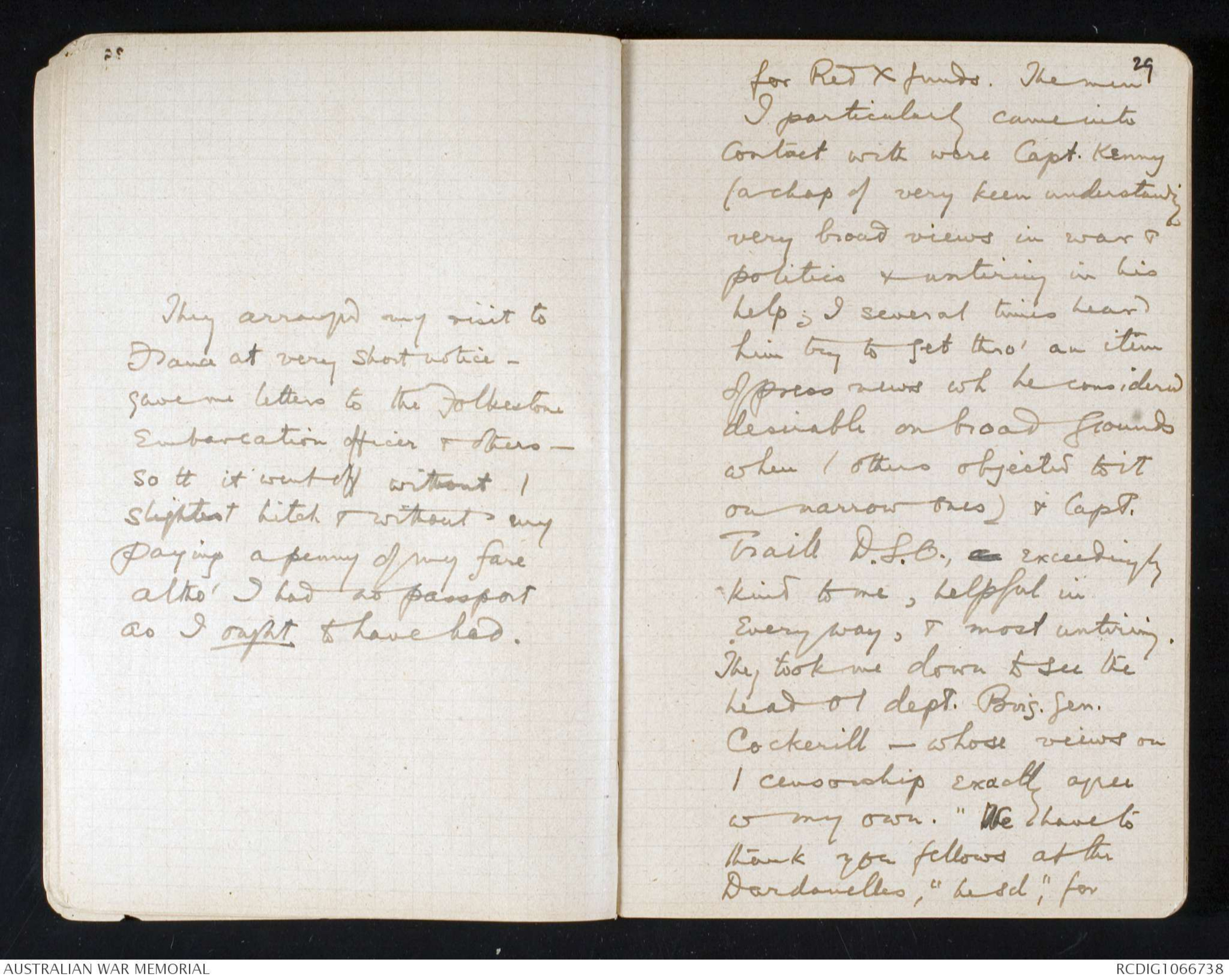
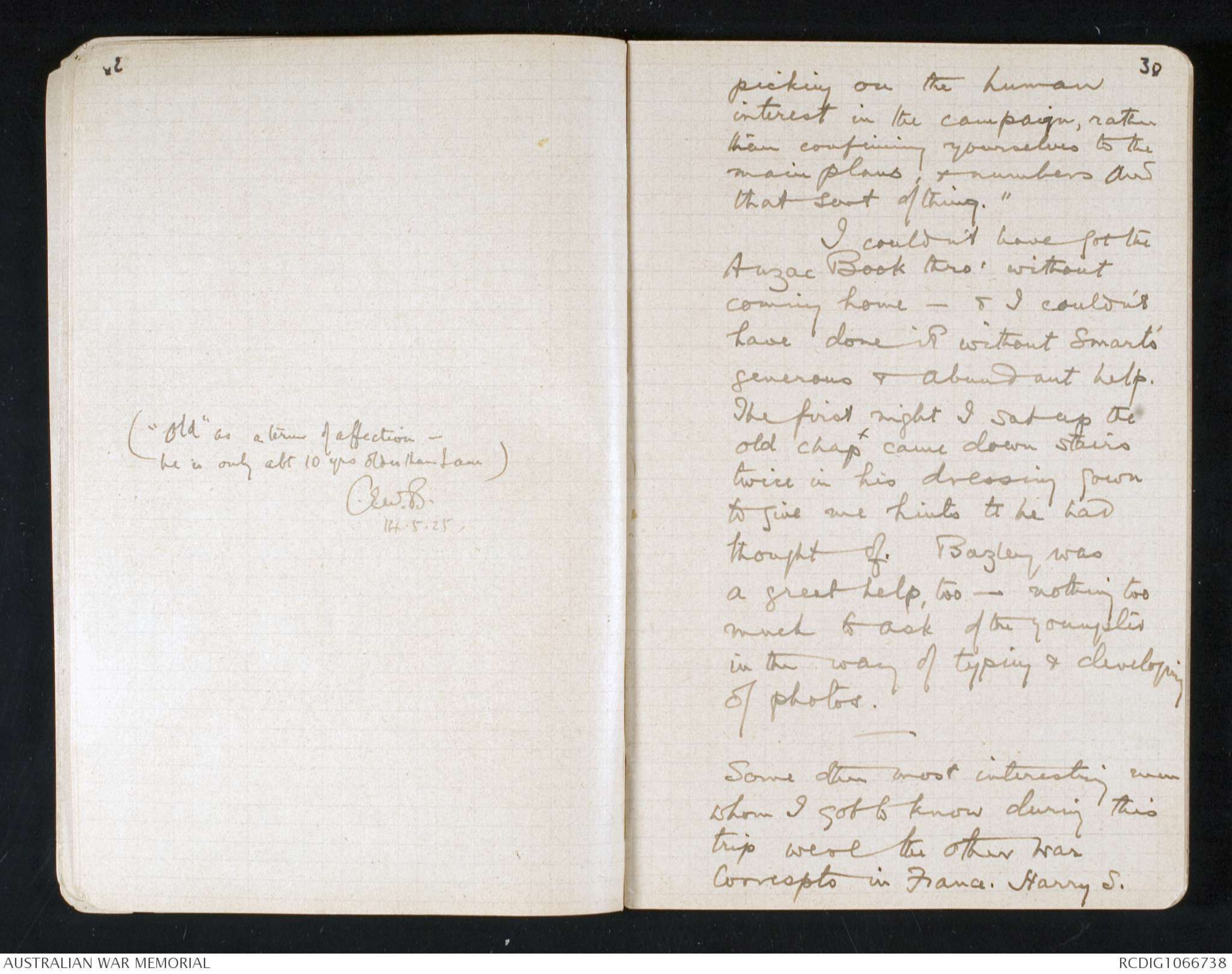
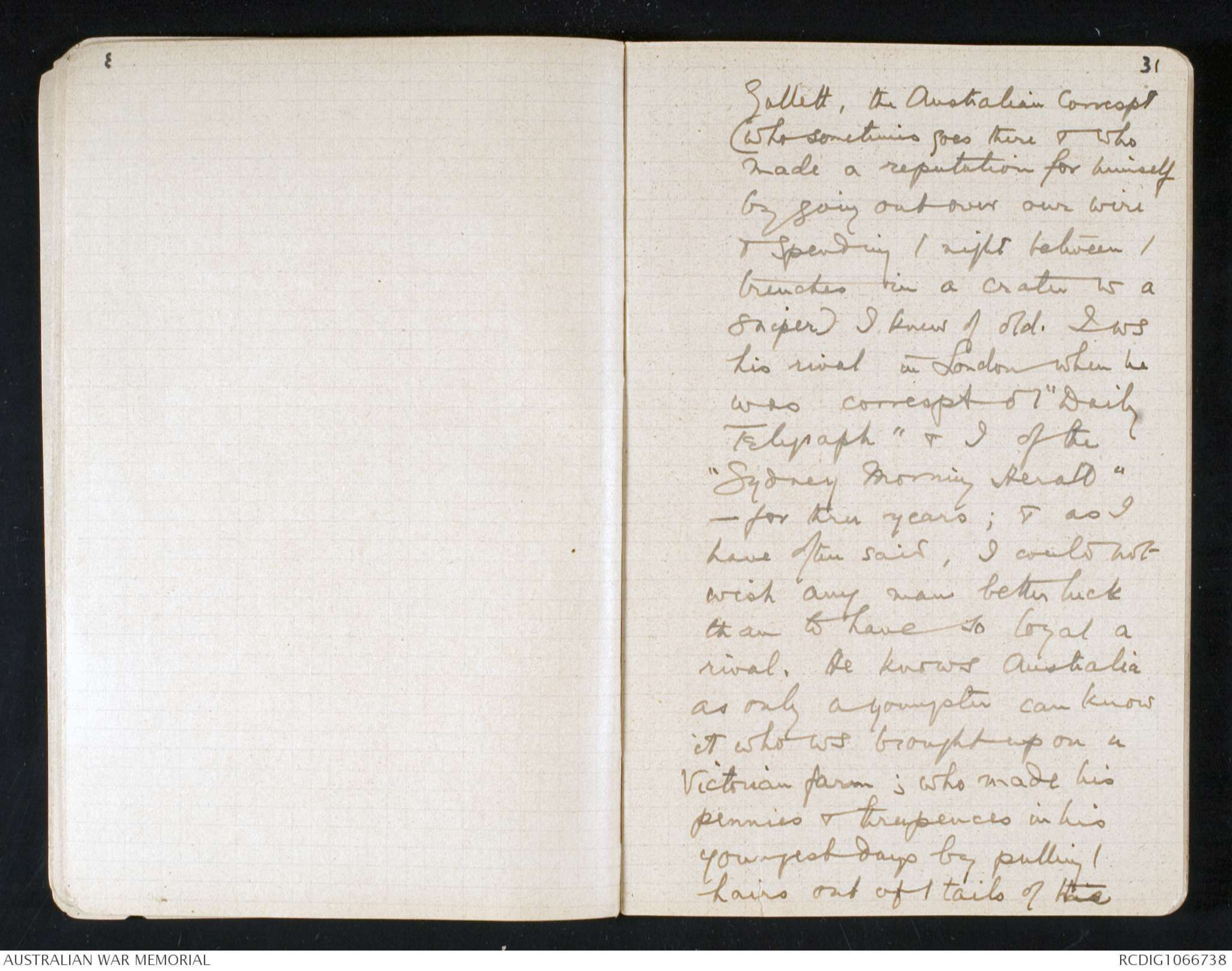
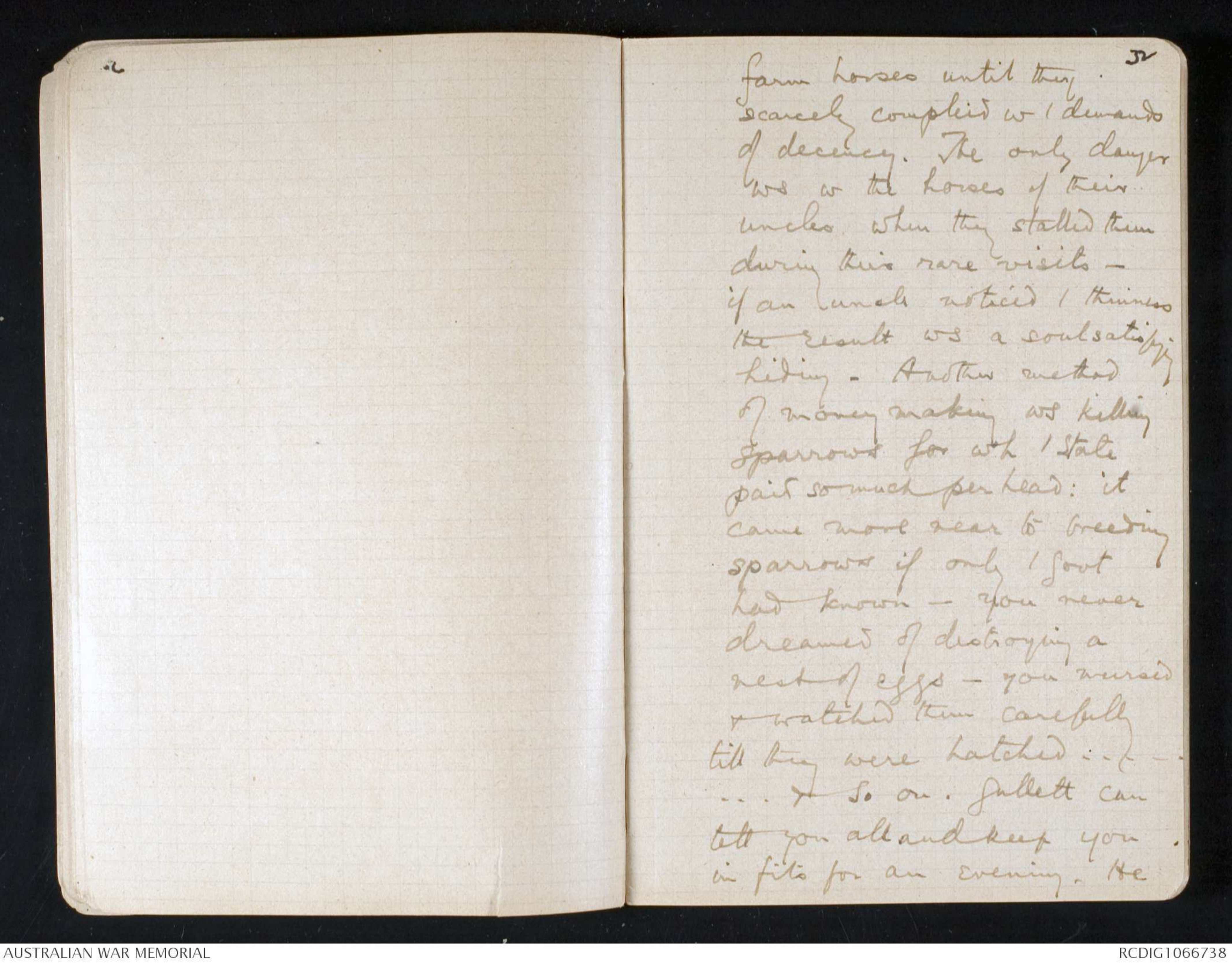
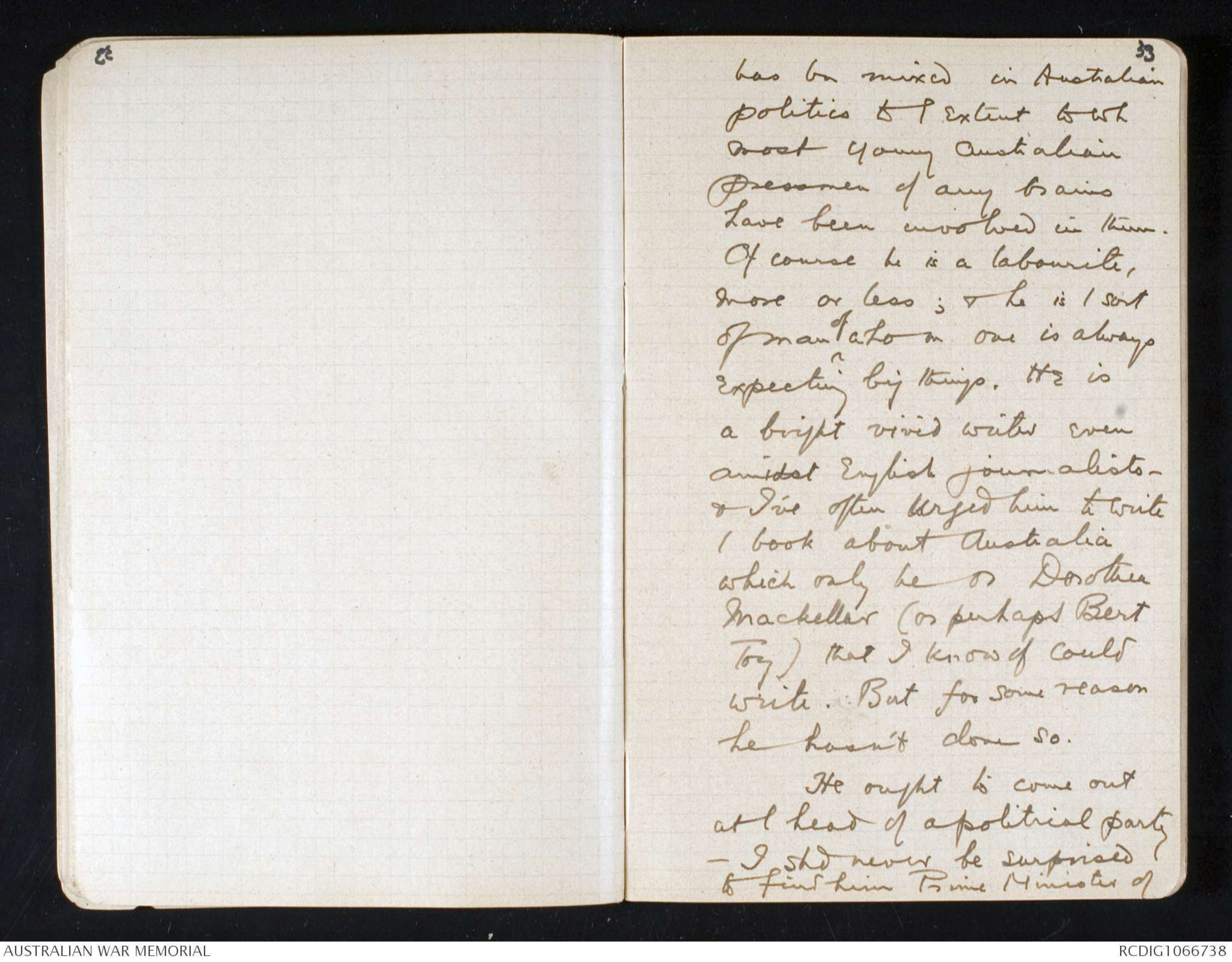
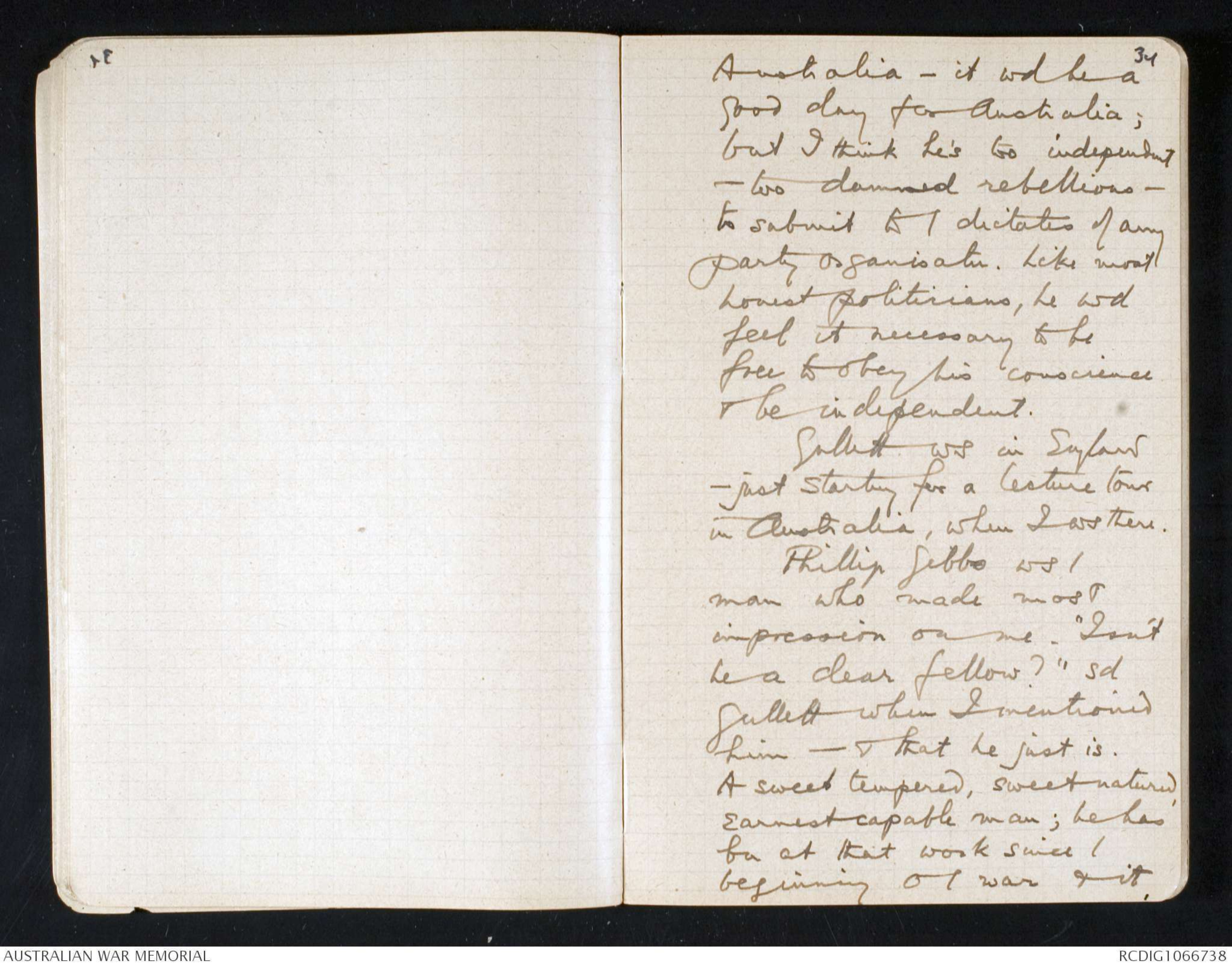
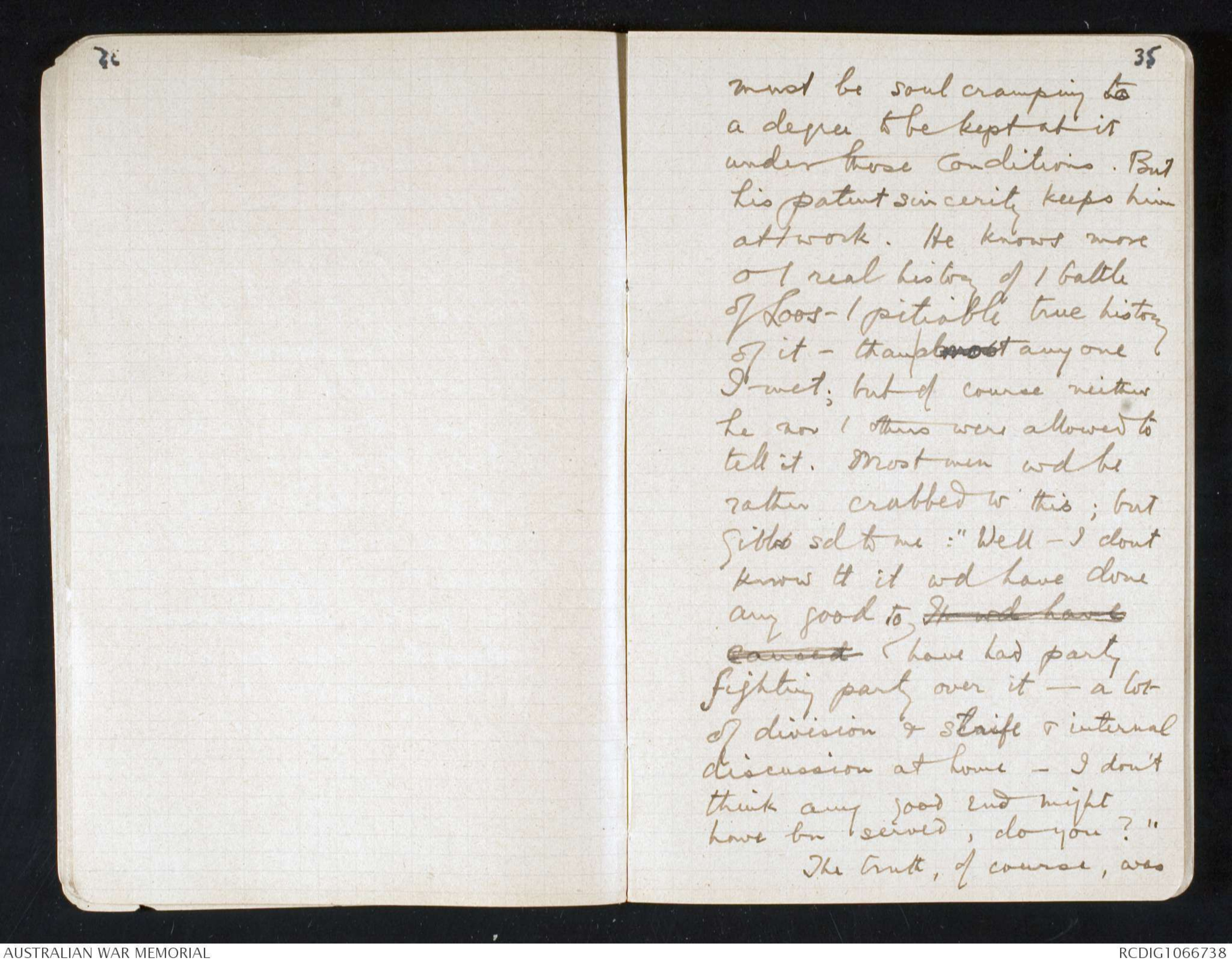
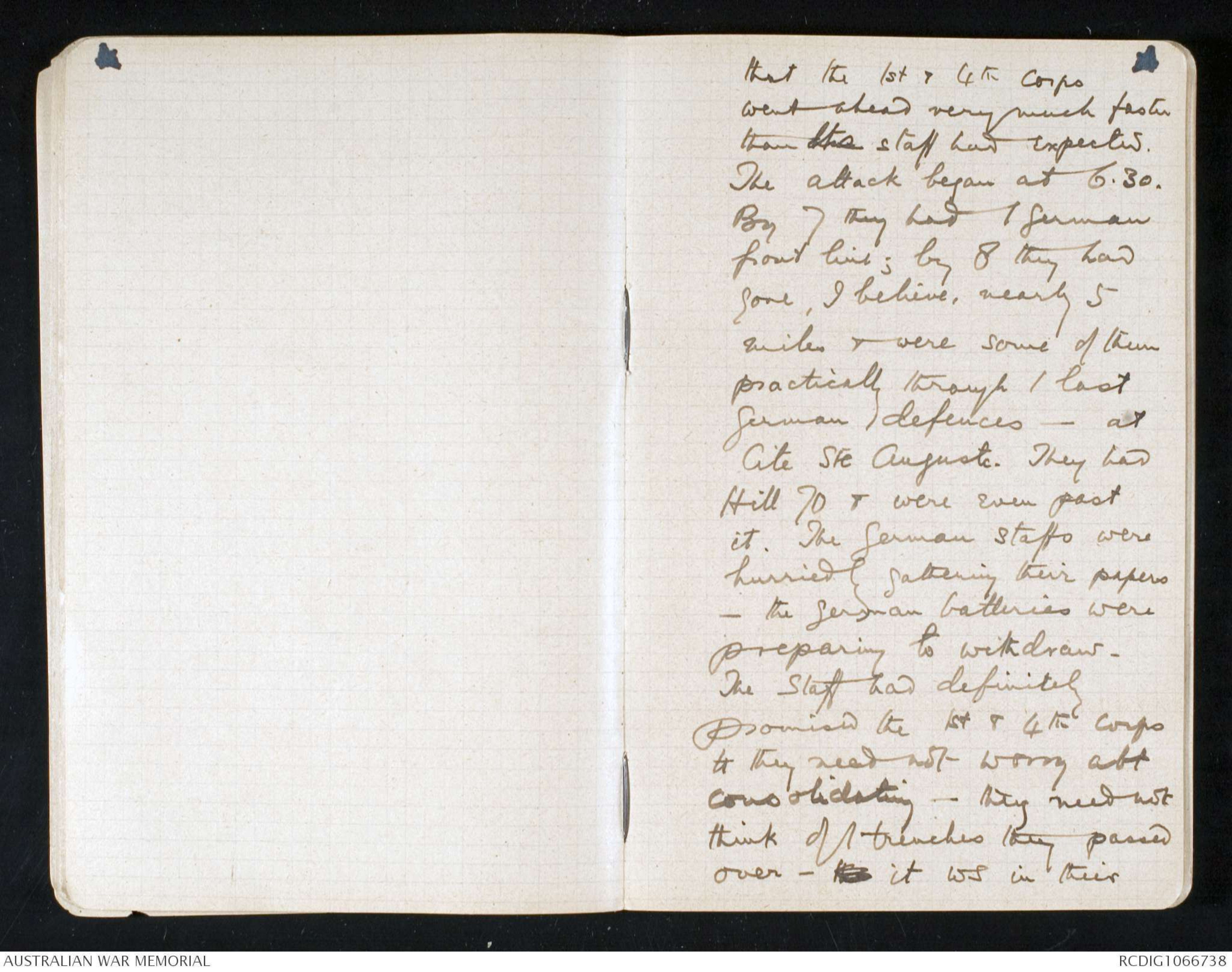
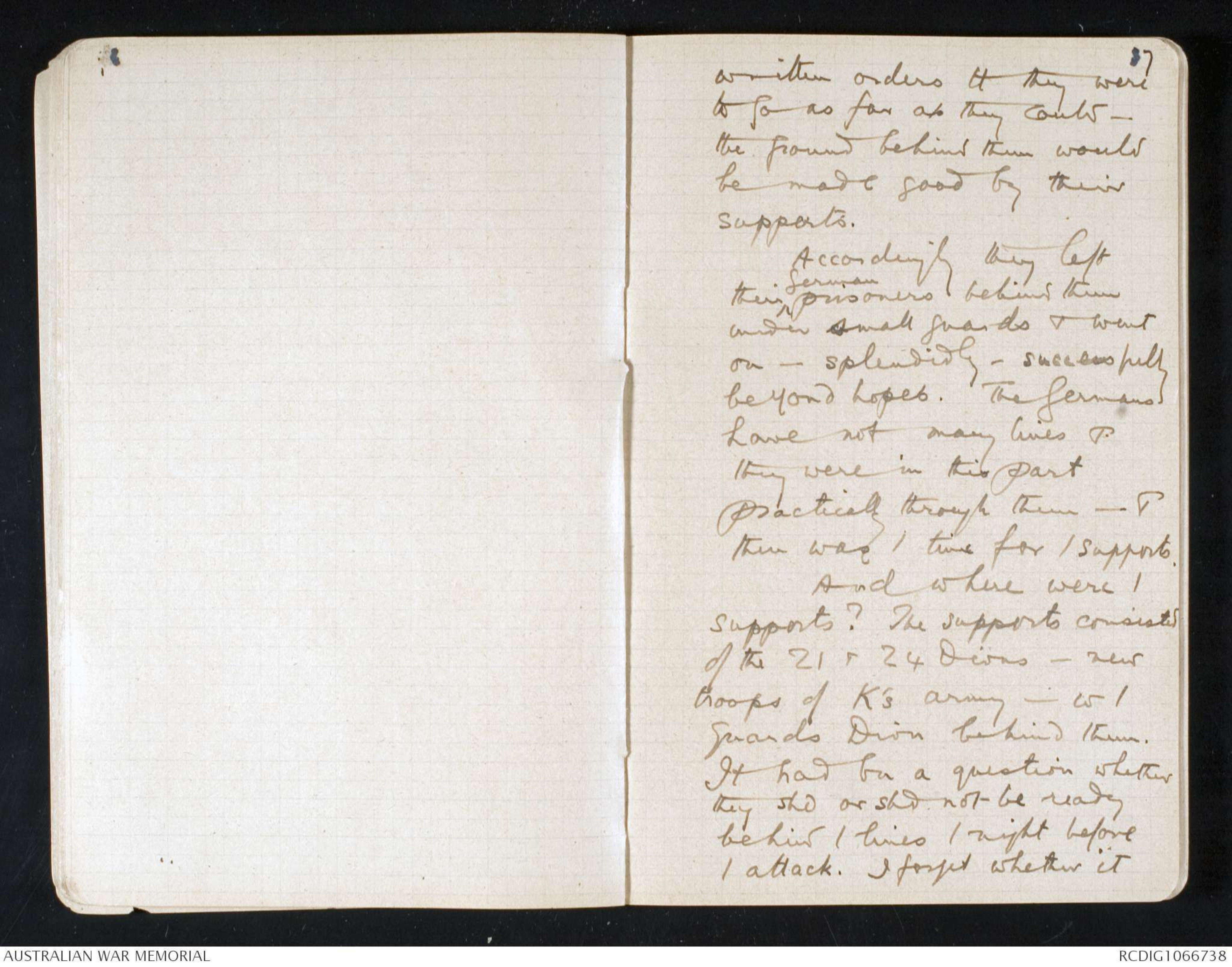
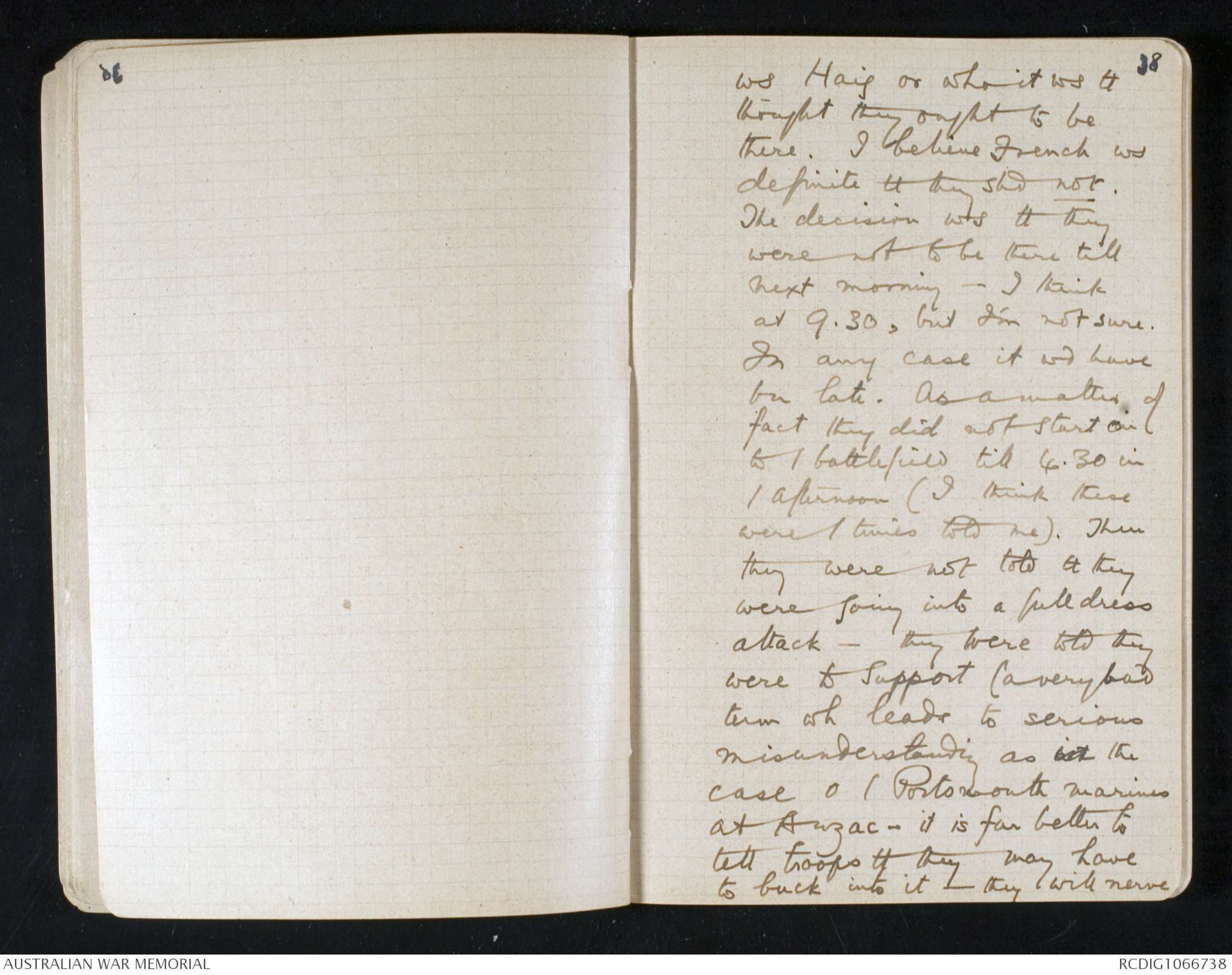
28
They arranged my visit to
France at very short notice-
gave me letters to the Folkestone
Embarcation officer & others -
so tt it went off without /
slightest hitch & without my
paying a penny of my fare
altho' I had no passport
as I ought to have had.
29
for Red X funds. The men
I particularly came into
contact with were Capt. Kenny
(a chap of very keen understanding
very broad views in war &
politics & untiring in his
help; I several times heard
him try to get thro' an item
of press news wh he considered
desirable on broad grounds
when / others objected to it
on narrow ones) & Capt.
Traill D.S.O., an exceedingly
kind to me, helpful in
every way, & most untiring.
They took me down to see the
head o / dept. Brig. Gen.
Cockerill - whose views on
/ censorship exactly agree
w my own. "We have to
thank you fellows at the
Dardanelles," he sd, "for
("old" as a term of affection -
he is only abt 10 yrs older than I am)
C.E.W.B.
14.5.25.
30
picking on the human
interest in the campaign, rather
than confining yourselves to the
main plans, & numbers and
that sort of thing."
I couldn't have got the
Anzac Book thro' without
coming home - & I couldn't
have done it without Smart's
generous & abundant help.
The first night I sat up the
old chapx came down stairs
twice in his dressing gown
to give me hints tt he had
thought of. Bazley was
a great help, too - nothing too
much to ask of the youngster
in the way of typing & developing
of photos.
——
Some other most interesting men
whom I got to know during this
trip were the other war
Correspts in France. Harry S.
31
Gullett, the Australian Correspt
(who sometimes goes there & who
made a reputation for himself
by going out over our wire
& spending / night between /
trenches in a crater w a
sniper) I knew of old. I ws
his rival in London when he
was correspt o / "Daily
Telegraph" & I of the
"Sydney Morning Herald"
- for three years; & as I
have often said, I could not
wish any man better luck
than to have so loyal a
rival. He knows Australia
as only a youngster can know
it who ws brought up on a
Victorian farm; who made his
pennies & threepences in his
youngest days by pulling /
hairs out of / tails of his
32
farm horses until they
scarcely complied w / demands
of decency. The only danger
ws w the horses of their
uncles when they stalled them
during their rare visits -
if an uncle noticed / thinness
the result ws a soul satisfying
hiding - Another method
of money making ws killing
Sparrows for wh / state
paid so much per head: it
came more near to breeding
sparrows if only / Govt
had known - you never
dreamed of destroying a
nest of eggs - you nursed
& watched them carefully
till they were hatched. . . . .
. . . & So on. Gullett can
tell you all and keep you
in fits for an evening. He
33
has bn mixed in Australian
politics to / extent to wh
most young Australian
Pressmen of any brains
have been involved in them.
Of course he is a labourite,
more or less; & he is / sort
of man ^of whom one is always
expecting big things. He is
a bright vivid writer even
amidst English journalists -
& I've often urged him to write
/ book about Australia
which only he or Dorothea
Mackellar (or perhaps Bert
Toy) that I know of could
write. But for some reason
he hasn't done so.
He ought to come out
at / head of a political party
- I shd never be surprised
to find him Prime Minister of
34
Australia - it wd be a
good day for Australia;
but I think he's too independent
- too damned rebellious -
to submit to / dictates of any
party organisatn. Like most
honest politicians, he wd
feel it necessary to be
free to obey his conscience
& be independent.
Gullett ws in England
- just starting for a lecture tour
in Australia, when I ws there.
Phillip Gibbs was /
man who made most
impression on me. "Isn't
he a dear fellow?" sd
Gullett when I mentioned
him. - & that he just is.
A sweet tempered, sweet natured,
earnest capable man: he has
bn at that work since /
beginning o / war & it
35
must be soul cramping to
a degree to be kept at it
under those conditions. But
his patient sincerity keeps him
at / work. He knows more
o / real history of / battle
of Loos - / pitiable true history
of it - than/almost any one
I met; but of course neither
he nor / others were allowed to
tell it. Most men wd be
rather crabbed w this; but
Gibbs sd to me: "Well - I don't
know tt it wd have done
any good to, It wd have tocaused have had party
fighting party over it – a lot
of division & strife & internal
discussion at home - I don't
thank any good end might
have bn served, do you?"
The truth, of course, was
36
that the 1st & 4th Corps
went ahead very much faster
than HQ staff had expected.
The attack began at 6.30.
By 7 they had / German
front line; by 8 they had
gone, I believe, nearly 5
miles & were some of them
practically through / last
German defences - at
Cite Ste Auguste. They had
Hill 70 & were even past
it. The German staffs were
hurriedly gathering their papers
- the German batteries were
preparing to withdraw -
The Staff had definitely
promised the 1st & 4th Corps
tt they need not worry abt
consolidating - they need not
think of / trenches they passed
over - the it ws in their
37
written orders tt they were
to go as far as they could -
the ground behind them would
be made good by their
supports.
Accordingly they left
their ^German prisoners behind them
under small guards & went
on - splendidly - successfully
beyond hopes. The Germans
have not many lines &
they were in this part
practically through them - &
there was / time for / supports.
And where were /
supports? The supports consisted
of the 21 & 24 Divns - new
troops of K's army - w /
Guards Divn behind them.
It had bn a question whether
they shd or shd not be ready
behind / lines / night before
/ attack. I forget whether it
38
ws Haig or who it ws tt
thought they ought to be
there. I believe French ws
definite tt they shd not.
The decision was tt they
were not to be there till
next morning - I think
at 9.30, but I'm not sure.
In any case it wd have
bn late. As a matter of
fact they did not start on
to / battlefield till 4.30 in
/ afternoon (I think these
were / times told me). Then
they were not told tt they
were going into a full dress
attack - they were told they
were to Support (a very bad
term wh leads to serious
misunderstanding as xxx the
case o / Portsmouth marines
at Anzac - it is far better to
tell troops tt they may have
to buck into it - they will nerve
 Lulu B
Lulu BThis transcription item is now locked to you for editing. To release the lock either Save your changes or Cancel.
This lock will be automatically released after 60 minutes of inactivity.